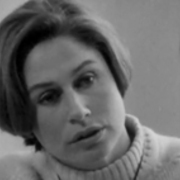
Dell King
King grew up in the King Country then Hamilton, under the name Dell Calvert. She moved to Wellington, hoping to direct films, before discovering that the Government’s National Film Unit had closed its doors to women directors.
Hoping to “wangle my way in somehow”, she instead began at the NFU in 1957, working as a negative cutter. The job involves editing the original negative of the film to match decisions already made by the editor.
By 1961 she had left the unit, to start a family with NFU director John King. Already a theatre fan, she joined Wellington’s Unity Theatre, initially as “general dogsbody”. King was soon directing, and over a 10 year period helmed plays for both Unity and Nola Millar’s New Theatre, including TS Eliot’s The Cocktail Party, and absurdist hit Next Time I’ll Sing to You.
King was also acting. She appeared in Downstage play The Nuns, and guested in an episode of early 70s TV series Pukemanu, as a married woman who meets up with an old flame. She also cameos as a social welfare official in NFU production Gone Up North for a While.
In the 60s King had worked as a negative cutter on Pacific Films movie Runaway, the first Kiwi feature film in 12 years. Because she had small children, King worked nights, from a “dingy” cutting room on Taranaki Street.
In 1972 Pacific boss John O’Shea invited her to join the company. She trained under editor Ian John on episodes of landmark series Tangata Whenua. Watching unedited footage of Māori talking about their lives was “one of the most rewarding and challenging things” King had ever known, leaving her with a strong feeling of empathy for Māori.
After John left the company, King took over editing on a number of projects directed by Tangata Whenua director Barry Barclay, including documentary memoir Autumn Fires (King also provided narration). When Barclay made his feature film debut on landmark feature film Ngati, King got the job. She talks in detail about Ngati, and editing in book, Shadows on the Wall. King would later work with Barclay again after Simon Reece left the edit of the trouble-plagued Te Rua.
For King, one of the differences between Pākehā and Māori filmmaking is that Māori filmmaking leaves more “space for resonance”, and a kind of music. King: “In the Māori vision of the way the universe works, the interaction of all things, and the fact that people are pushed by forces which are emotionally powerful but not necessarily logical, means that you use that, and give the audience a chance to respond.”
King came to realise that whatever the material, the emotional structure of a film ultimately matters more than a so-called ‘logical’ structure.
King left Pacific in 1978 to form company Finecut Film Editing with Annie Collins (the company later became Film Perspectives, after Collins’ departure in 1981). There King worked on commercials, documentaries, and on the sound edits of a number of features from the Kiwi film renaissance: among them Samoan tale Sons for the Return Home, Solo, and the complex sound mix for 1984 classic Vigil.
King had long wanted to direct for the screen. She finally made her directorial debut with 1981 doco Burials in Ban Nadi, chronicling an archaeological dig in a Thai village.
By now King had set up independent company Preston King with director Gaylene Preston, who she had collaborated with on awardwinning 1978 doco All the Way Up There. King was to direct Taking Over, chronicling a group of teenagers on the boat Spirit of Adventure, when the film’s television funders demanded that Preston take over, thanks to her greater directing experience. Preston credits King as co-director and co-producer of the film, and in her online archives writes that she considers "this film rather more Dell’s project than my own.” King later edited Preston’s TV drama Married (1992).
King bowed out with 1995’s Dreamers and Schemers, in which Gary McCormick investigates the world of inventors.
And what of directing drama? In 1990, King handled the dramatic sequences for Ruia Taitea: The World is Where We Are, a documentary about writer Patricia Grace.
In book reframing Women, writer Deborah Shepard argues that Ruia Taitea’s “short sequences prove tantalising and poignant for they reveal Dell’s talent as a drama director”, after her earlier difficulties in gaining access to the director’s chair.
In 1992, producer Robin Laing, worried at a lack of women’s perspectives on television, gathered a team of women filmmakers to produce four dramas under the mantle Anthology Drama. King produced and edited one of them: 60-something romance Matrons of Honour, whose femme-heavy crew was commanded by another woman with many years of industry experience: Pat Robins.
Now retired, Dell King and her husband live in Paeroa. Both continue to keep their hands in matters creative, through local theatre (Dell as a director, John on stage).
Sources include
Dell King
Barbara Cairns and Helen Martin, Shadows on the Wall - A Study of Seven New Zealand Feature Films (Auckland: Longman Paul, 1994)
Deborah Shepard. reframing Women - A History of New Zealand film (Auckland: HarperCollinsPublishers, 2000)
Gaylene Preston. Production archive entry for Taking Over (Entry Number 14). gaylenepreston.com website. Accessed 23 March 2011